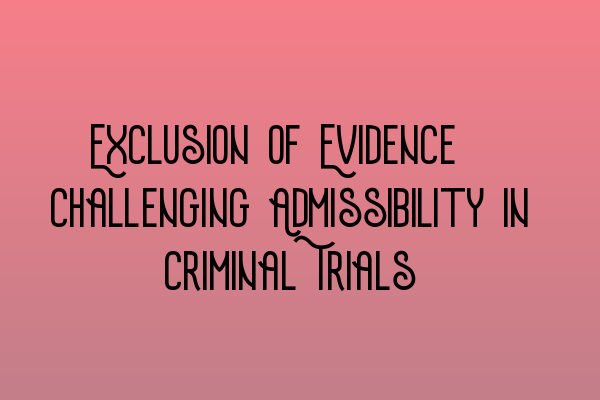Exclusion of Evidence: Challenging Admissibility in Criminal Trials
As a criminal defense solicitor, it is crucial to understand the intricacies of challenging the admissibility of evidence in criminal trials. The exclusion of evidence can significantly impact the outcome of a case, potentially leading to acquittal or reduced charges for your client.
When representing a client, identifying grounds for challenging evidence admissibility is a critical first step. The rules of evidence play a crucial role in ensuring fairness and justice within criminal proceedings.
The exclusionary rule, as established by the courts, prohibits the admission of evidence that has been illegally obtained. This rule serves to protect individuals from improper police conduct and maintain the integrity of the legal system.
There are various grounds for challenging the admissibility of evidence, and it is essential to be familiar with each one to effectively advocate for your client. Some common grounds include:
- Unlawful Search and Seizure: Evidence obtained through an illegal search or seizure may be subject to exclusion. It is vital to assess whether proper protocols were followed and if the search/seizure was within the boundaries of the law.
- Improper Handling or Chain of Custody: If there are concerns regarding the handling or chain of custody of the evidence, it may be possible to challenge its admissibility. This can include issues such as tampering, contamination, or mishandling.
- Coerced Confessions: If a confession was obtained through coercion or in violation of the suspect’s rights, it may be possible to challenge its admissibility. This requires a careful review of the circumstances surrounding the confession and determining if any rights were violated.
- Hearsay: Hearsay evidence, which is an out-of-court statement offered to prove the truth of the matter asserted, is generally inadmissible. However, there are exceptions, and knowledge of these exceptions is crucial in determining whether the evidence should be excluded.
- Expert Testimony: Challenging the qualifications or methodology of an expert witness can also lead to the exclusion of their testimony. Understanding the requirements for expert evidence and conducting a thorough analysis of the expert’s credentials can be essential in mounting a successful challenge.
It is important to note that the admissibility of evidence is ultimately determined by the judge overseeing the trial. When preparing to challenge evidence, it is crucial to present persuasive arguments supported by relevant case law.
At SQE Criminal Law & Practice Law UK, we understand the significance of staying up-to-date with the latest developments in criminal law. Our SQE 1 Practice Exam Questions and SQE 1 Practice Mocks FLK1 FLK2 provide valuable preparation resources for aspiring solicitors.
If you’re looking to enhance your knowledge and skills further, our SQE 2 Preparation Courses and SQE 1 Preparation Courses can provide comprehensive guidance, covering essential topics in criminal law and practice.
For those in the process of planning their legal careers, our SRA SQE Exam Dates page offers a helpful overview of upcoming examination dates and important milestones in the SQE assessment process.
In conclusion, successful exclusion of evidence requires a thorough understanding of the grounds for challenging admissibility and persuasive advocacy. Staying informed about current legal developments and utilizing reliable preparation resources can significantly enhance your ability to navigate the complexities of criminal law.
Remember, as a criminal defense solicitor, your role is pivotal in safeguarding the rights of your clients and ensuring a fair and just legal system.
